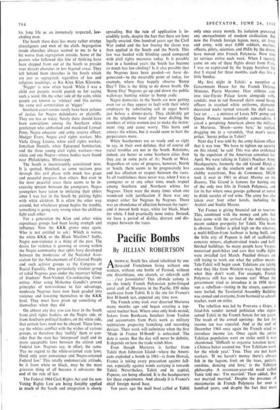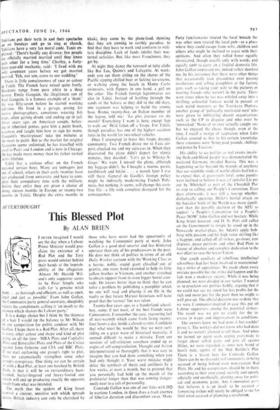Pacific Bombs
By JILLIAN ROBERTSON
ATROPICAL South Sea island inhabited by one thousand Frenchmen living without one woman, without one bottle of Pernod, without one discotheque, one church, or sidewalk café . . . c'est formidable! This all-male colony is on the lonely French Polynesian palm-fringed coral atoll of Mururoa in the Pacific, 850 miles south-east from Tahiti. It is the site for France's first H-bomb test, expected any time now.
The French army took over deserted Mururoa many months ago and began creating a top- secret nuclear base. Where once only birds nested, bakers from Bordeaux, butchers from Toulon and accountants from Paris work as military technicians preparing launching and recording devices. Their work will culminate when the first 'Made in France H-Bomb' is unleashed. The date is secret. But the day will never be definite. It depends on how the trade winds blow.
Even though Mururoa is farther from Tahiti than Johnston Island—where the Ameri- cans exploded a bomb in 1961—is from Hawaii, France is taking every precaution against fall- out, especially against winds carrying it towards Tahiti. Nevertheless, Tahiti and its capital, Papeete, are being affected. It is the headquarters for these experiments. And already it is France's chief foreign naval base.
Ten years ago the mail boat called at Tahiti only once every month. Its isolation prevented any encroachment of modern civilisation. But now the French foreign legion, navy, air force and army, with over 6,000 soldiers, marines, officers, pilots, scientists and PhDs by the dozen, have moved into French Polynesia. Now nine jet services arrive each week. When I recently came on one of these flights direct from Paris, I was so captivated by the happy barefoot life that I stayed for three months, each day like a little Sunday.
My first night in Tahiti : a reception at Government House for the French Defence Minister, Pierre Messmer. Dior stilletos sank into vice-Elysee Palace lawns alongside raffia sandals; men in red flowered shirts stood beside officers in starched white uniforms, diamond- decorated necks turned towards the shell neck- lace set . . . a mixture of Louis XIV pomp and Queen Pomare mumbo-jumbo camaraderie. I asked a perspiring American about the military in Mururoa. 'Shush—come here,' he replied, dragging me to a verandah, 'that man's secret police.' Secret police in Tahiti?
Next day I was told by the army liaison officer that it was true. 'We have to tighten up security on this island,' he said. This was also evidenced by the expulsion of the American consulate last April. We were talking in Tahiti's Nuclear Army Headquarters, 'formerly the old Grand Hotel, a cream block at the southern end of the night- clubby waterfront, Rue de Commerce. MGM took it over in 1961 to direct Mutiny on the Bounty. The Grand is famous for having one of the only two lifts in French Polynesia, and for its bar where once gossips gathered at sunset to drink carafes of red wine. The army has also taken over four other hotels, including the Arahiri and Studio Moana.
Yet France is giving financial aid to tourism. This, combined with the money and jobs that have come with the arrival of the military, has meant sudden prosperity for Tahiti. The boom is obvious. Timber is piled high on the wharves, a multi-billion-franc harbour is being built, and the little city of Papeete is full of scaffolding, concrete mixers, elephant-sized trucks and half- finished buildings. So many people have Vespas, motorised push-bikes and cars that traffic lights were installed last March. Puzzled drivers are still trying to work out what the yellow means. Tele-Tahiti will begin soon. Tahitians are taking what they like from Western ways, but rejecting what they don't want. For example, French Polynesia still has no income tax! When the government tried to introduce it in 1958 there was a rebellion—rioting in the streets, coconuts were hurled, the Territorial Assembly Building was stoned and everyone, from barmaid to school- teacher, went on strike.
The rebellion was led by Pouvana a Oopa, a fried-fish vendor turned politician who repre- sented Tahiti in the French Senate for ten years. The result of the armed uprising: the law for income tax was repealed. And at the end of December 1964 once again the French tried to introduce income tax. Once again the entire Tahitian population went on strike until it was abandoned. 'Difficult to organise taxation here,' a Chinese baker assured me. 'Few Tahitians work for the whole year.' True. They are not keen workers. 'If we haven't money there's always fish in the lagoon, fruit on the trees, guitars, sunshine, dancing and love,' is the Tahitian philosophy. A seventeen-year-old maid called Tank told me: 'I'm married.' Then added, 'But not married married.' Despite the presence of missionaries in French Polynesia for over a hundred years, and despite the fact that most Tahitians put their teeth in and their spectacles on on Sundays and go to sing at church, Tahitians have a very lax moral code. Tanie ex- plained: 'There's hardly any divorce; few people are officially married married until they know each other for a long time.' Charley, a forty- three-year-old mechanic, said: 'I lived with me wife seventeen years before we got married married. Yeh, our son, came to our wedding.'
There is little consciousness of race or colour in Tahiti. The French have mixed quite freely. Residents range from pure white to a deep bronze. Emile Gauguin, the illegitimate son of Paul Gauguin, is a famous example of a 'demi.' He was fifty-seven before he started working full-time. He lived in a garage, posing for tourist photographers, sometimes weaving fish traps, often getting drunk and ending up in jail. Three years ago, an American couple, believ- ing in inherited genius, gave him a paint brush, a canvas and taught him how to sign his name. Gauguin's 'masterpieces' take ten minutes at the most to paint. But as the market for original Gauguins seems unlimited, he has travelled with easel to Paris and London and is now in Chicago. He has made more money than his father earned in his lifetime.
Tahiti has a curious effect on the French national service boys. Many are teenagers just out of school, others in their early twenties have just graduated from university and have to com- plete their compulsory time with the military. Before they enlist they are given a choice of doing sixteen months in Europe or twenty-two months in Tahiti. Despite the extra months in khaki, they come by the plane-load, thinking that they are coming to earthly paradise, to find that they have to work and conform to mili- tary discipline. Lack of funds inhibit their noc- turnal activities. But, like most Frenchmen, they get by.
At night they dance the tamoure at tatty clubs like Bar Lea, Quinn's and Lafayette. At week- ends you see them sitting on the shores of the Pacific sipping chilled beer or licking ice-creams, or walking along the beach in Monte Carlo swimsuits, with flippers in one hand, a girl on the other. The French foreign legionnaires are also in Tahiti. Instead of battling through the sands of the Sahara as they did in the old days, one regiment was helping to build the atomic base. Bruno, twenty-five, an Italian member of the legion, told me : 'La plus joyeuse vie du monde! Everything I want is here, except legs to walk on.' He'd fallen off a Vespa. For Tahiti, though paradise, has one of the highest accident rates in the world for two-wheel vehicles.
Once I attempted to leave this tropic dreamy community. Two French drove me to Fasa air- port, checked me and my suitcases in. When they discovered the plane didn't depart for ninety minutes, they decided: 'Let's go to Whisky-A- Gogo.' We went. I missed the plane, although my luggage didn't. So I bought a mumu, pareo, toothbrush and bikini . . . a month later I was still there. General de Gaulle's foreign policy might be indirectly modernising French Poly- nesia, but nothing, it seems, will change this care- free life—a life with complete disregard for the consequences.















































 Previous page
Previous page